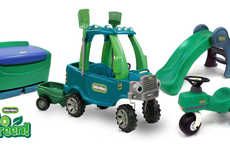
LEGO Announced Plans to Stop the Production of Plastic Blocks by 2030
Grace Mahas — December 27, 2019 — Eco
References: lego & climateaction.org
In the wake of climate change and the plastic pollution crisis, iconic toy company LEGO recently announced that it plans to stop the production of plastic blocks by 2030 and all pieces will be made from plant-based materials. The new blocks will be made from polyethylene, which is made from sugar cane.
Tim Brooks, Vice President of environmental responsibility at LEGO, said: “At Lego, we want to make a positive impact on the world around us, and we are working hard to make great play products for children using sustainable materials. This is a great first step in our ambitious commitment of making all Lego bricks using sustainable material.”
LEGO also announced the brand will use 100% renewable energy by 2020 and recently launched the Replay initiative to recycle old toys.
Image Credit: Shutterstock
Tim Brooks, Vice President of environmental responsibility at LEGO, said: “At Lego, we want to make a positive impact on the world around us, and we are working hard to make great play products for children using sustainable materials. This is a great first step in our ambitious commitment of making all Lego bricks using sustainable material.”
LEGO also announced the brand will use 100% renewable energy by 2020 and recently launched the Replay initiative to recycle old toys.
Image Credit: Shutterstock
Trend Themes
1. Sustainable Material Toys - More toy companies will follow LEGO's lead and switch to sustainable, plant-based materials for their products, creating opportunities for the development of new materials and manufacturing processes.
2. Renewable Energy Usage - Companies in various industries will shift to 100% renewable energy usage in order to reduce their carbon footprint and appeal to environmentally conscious consumers, with opportunities for renewable energy development and implementation.
3. Toy Recycling Initiatives - Toy companies will introduce recycling initiatives for old and unused toys, leading to recycling innovation and opportunities in waste management and sustainability industries.
Industry Implications
1. Toy Manufacturing - Toy manufacturers will need to find alternative, sustainable materials and manufacturing processes to keep up with the growing demand for environmentally friendly products.
2. Renewable Energy - Renewable energy technology providers and installers will experience growth as more companies aim to shift to 100% renewable energy usage in order to reduce their carbon footprint.
3. Waste Management - Waste management companies will need to adapt to the increase of recycling initiatives for toys and other products, as well as the development of new materials and implementation of sustainable manufacturing processes.
5.4
Score
Popularity
Activity
Freshness























